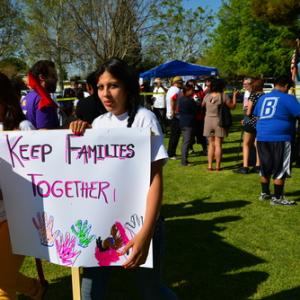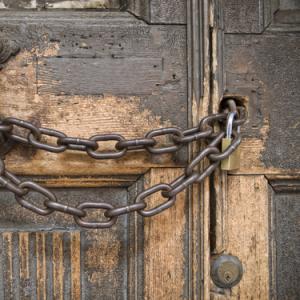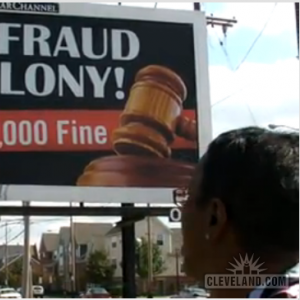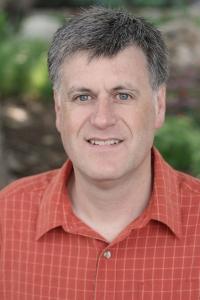
Troy Jackson is Director of the Ohio Prophetic Voices campaign, an initiative to gather more than 500 clergy in Ohio to organize for racial and economic justice.
Troy has been involved in community organizing for four years—first as a volunteer leader and then as a faith organizer in Cincinnati and throughout Ohio. He has been actively involved in calling for comprehensive immigration reform and the Dream Act, and recently finished serving as faith outreach director for the highly successful We Are Ohio campaign that led to the repeal of Ohio Senate Bill 5 by a 61-39 margin.
In addition to his organizing work, Troy formerly served as senior pastor of University Christian Church (UCC) in Cincinnati, Ohio for 19 years. UCC is a part of the Christian Community Development Association, a network of churches and organizations working to reshape urban neighborhoods. Under Troy’s leadership, UCC established Rohs Street Café, a seven-day-a-week community coffee shop committed to community engagement, the arts, and social justice.
Troy is a graduate of Princeton Theological Seminary and earned his Doctor of Philosophy degree in U.S. history from the University of Kentucky. Troy’s book Becoming King: Martin Luther King, Jr. and the Making of a National Leader (The University Press of Kentucky, 2008) explores the critical role the grassroots Montgomery Movement played in the development of Dr. King. His other publications include his work as an editor on The Papers of Martin Luther King, Jr. Volume VI: Advocate of the Social Gospel (September 1948-March 1963) (University of California Press, 2007). He is also a regular blogger on the God’s Politics blog. Troy lives in Cincinnati with his wife Amanda and their three children Jacob, Emma, and Ellie.
Posts By This Author
Engaging the Powers: The Promise of a New Civil Rights Era

Occupy Wall Street gathering in 2012, gabriel12 / Shutterstock.com
In the past few years, a new era of civil rights organizing has emerged out of the depths of tragedy and despair. The list of names of young African Americans who have died at the hand of police, out-of-control vigilantes, and hate-filled white terrorists has fostered profound lament and intense anger. The simple phrase, “Black Lives Matter” has galvanized activism, mobilizing, and organizing.
This new civil rights battle includes legislative battles at state houses like South Carolina, leading to the removal of the Confederate flag from the grounds. There is work to do in D.C. as well. Yet the real front of this new era will be on the corporate scene, on Wall Street and with economic power brokers and corporations. It is time to go “over the heads” of politicians and enter into dialogue and debate with corporations over the value and dignity of dark bodies, and how to reconstruct a moral economy that is not profiting off of people of color.
Engaging Ferguson's Youth with Humility and Repentance
“Get the word out. Teach all these things. And don’t let anyone put you down because you’re young. Teach believers with your life: by word, by demeanor, by love, by faith, by integrity.” –1 Timothy 4:12 (The Message)
In our recent book Forgive Us: Confessions of a Compromised Faith, Mae Cannon, Lisa Sharon Harper, Soong-Chan Rah, and I call the American church to a posture of repentance due to all the times we have not only been on the wrong side of history, but on the wrong side of God.
As an organizer and director of the AMOS Project in Cincinnati, I’ve discovered that a humble spirit of repentance is critical to powerful work around racial and economic justice. There can be a strong temptation to replay colonialism by having all the answers and believing we are God’s gift to the oppressed. We white evangelicals are particularly susceptible to this arrogant path. Humility and a repentant spirit are key to a healthy engagement and partnership in our work.
Full-Body Repentance
"Forgive Us," by Mae Elise Cannon, Lisa Sharon Harper, Troy Jackson, and Soong-Chan Rah
THE CRY OF the church to the world should be “Forgive us.”
At a time when the American church struggles with finding its place in the world and struggles with asserting its identity, could the church be known as the community that models confession, repentance, and the seeking of forgiveness? At this moment in history, the American church is often ridiculed or portrayed as unforgiving and ungracious. Could the church offer a counter-narrative, not of defensiveness or derision but of an authentic confession and genuine reconciliation? By examining seven different areas where the church has committed sin, we ask the church to consider the spiritual power and the theological integrity of a church that seeks forgiveness for those sins.
Our scriptures testify to the necessity of confession. Confession is central to the Christian faith. The importance of confession arises from the Christian view of sin. Sin is a reality and must be taken seriously. Evangelicals consistently begin our gospel presentation with the centrality of sin to the human experience. American evangelicals often assert that the beginning of the work of God’s forgiveness is the recognition of our need for God because of human sinfulness.
It is antithetical to the gospel when we do not confess all forms of sin—both individual and corporate. The reason evangelicals can claim to be followers of Jesus is because there has been an acknowledgement of sin and the seeking of God’s grace through Jesus Christ that leads to the forgiveness of sin.
11 Miles Backward?
Just two days ago at this hour, I was in the midst of an 11-mile journey for John Crawford. Led by young people of color, 85 of us marched through suburban and rural Greene County, Ohio from the Beavercreak Wal-Mart, the site of John Crawford’s death at the hands of police, to Xenia, Ohio, where the special grand jury would consider an indictment of the officers. What was Crawford’s “crime?” Carrying a toy gun around Wal-Mart while talking on a cell phone.
During the march, there were moments when I felt like we had gone back in time, to days of struggle in the rural South, pushing for black lives to matter in this country, from accommodations to the ballot box. Things were different, I thought. Fifty years ago, marchers had a legitimate fear of sniper fire. Buses carrying freedom riders were attacked and firebombed with impunity. Surely times have changed.
Today the grand jury in Ohio announced there will be no indictment of the officers. (The Justice Department later announced it is launching an investigation into the shooting.) The Wal-Mart surveillance video is now public, and it reveals how quickly Crawford’s life was taken. The special prosecutor, in quotes about the case, seems to have not pushed very hard for an indictment. So another black life is lost under absurd circumstances, and the system communicates yet again that black lives don’t matter.
Ten Practical Ways White Christians Can Respond to Ferguson
Like many of you, I’ve been overwhelmed and deeply saddened by the events that have transpired in Ferguson, Mo. And at times I’ve felt helpless, 350 miles away in Cincinnati, as friends of mine are in Ferguson praying, marching, organizing, and working for peace and justice.
In my conversations with friends of color, I have witnessed their pain and frustration and deep angst over the events of Ferguson. The past two weeks have hit very close to home for them.
With white friends, the response has been mixed, but the overwhelming sentiment is one I’ve already identified: helplessness. I am not satisfied with this response. I believe there are ways we can respond, bear witness, be in solidarity and work for justice in this moment. Our love for God and neighbor demands we engage. If you are like me, you are praying without ceasing for the Shalom, peace, and justice of God to reign in the hearts and minds and streets of Ferguson and throughout this nation and world. So how can we pair our prayers with constructive action?
Here are ten ways white Christians can respond to Ferguson.
Three Ways to Maintain Yourself While Maintaining a Movement
In July 2010 I joined with around 100 freedom fighters in Chicago, many of whom had traded the previous year of their lives to fight for comprehensive immigration reform. And we knew it was not going to happen in 2010, at least as we had imagined. Many in the room were exhausted, and defeated, and spent. The response from the campaign was to talk about the next hill to climb rather than deal with the pain and exhaustion in the room.
Doing justice is hard and exhausting work. We are compelled to action by the urgency of the suffering and pain and evil that mark life for so many in God’s world. And the work is never done. Win or lose, there is always another hill, another peak, another challenge that lies ahead. So the temptation is to keep on keeping on, and to rise to the next challenge.
For the past 20 years, I have either been a pastor or a community organizer, and for many of those years I have been both. For pastors and organizers, there is always one more email to write, one more call to make, and one more strategy to be explored. To be blunt, burnout and exhaustion are the order of the day.
Deep In My Heart
Saturday marked the 50th anniversary of the senseless slaughter and lynching of civil rights workers James Chaney, Andrew Goodman, and Michael Schwerner during Freedom Summer in Mississippi. They gave their lives to insure that every person in Mississippi would have the right to vote and be a full citizen of this nation. This interracial trio believed with all their hearts that it was worth it to put their bodies on the line for racial justice and dignity, and they paid the ultimate price.
We have come a long way in the last 50 years, but the recent deaths of Trayvon Martin and Jordan Davis in Florida remind us that much work remains, and that white supremacy may have taken different forms, but it is alive and well. And today, white supremacy operates most powerfully at the subconscious level. And it has to do with an innate feeling of superiority.
Why Have You Forsaken Me?
As we quickly approach Holy Week in the Christian calendar, our attention turns increasingly to the passion and crucifixion of Jesus. According to the Gospel accounts, one of the last phrases that Jesus spoke while suffering on the cross is a recitation of the opening line of Psalm 22: “My God, My God, why have you forsaken me?”
Even Jesus, whom Christians hold to be the Son of God, experienced feeling forsaken by his Heavenly Father. And the words of the Psalmist go further, “My God, my God, why have you forsaken me? Why are you so far from helping me, from the words of my groaning? O my God, I cry by day, but you do not answer; and by night, but find no rest.”
As I reflect on the plight of the undocumented immigrant in the United States today, I wonder if the words of the Psalmist, echoed by Jesus on the cross, don’t hit a little too close to home.
'Silence is Golden': The White Church and Race in America
Over the past week, as the nation has wrestled with the implications of the “not guilty” verdict in the George Zimmerman trial, I have concluded that many in white America are desperately trying to remind African Americans that, when it comes to race in America, silence is golden. Their effort implies that any honest dialogue about race that includes the stories and experiences of African Americans disturbs the idea of the “American experience” for those of a lighter hue.
This message came through loud and clear last Friday following President Obama’s unexpected and personal reflection on the death of Trayvon Martin and the verdict on the trial of George Zimmerman.
An American Story
My father is white, and has lived a different story. My son was the same age as Trayvon Martin when Martin was killed in Florida in 2012. My white teenage son lives a different story. But when I got on a flight early on Sunday morning following the verdict, I was seated next to an African-American woman with six children. The weight of the verdict was on her face, and she showed me a photo of her three sons, all wearing hoodies, for whom Martin’s death and the subsequent verdict hit very close to home. This is their story.
The Waiting
As I write, I'm stuck in the Central Wisconsin Airport (near the bustling metropolis of Wausau, Wis., for those keeping score at home). And, you guessed it, I'm waiting. Fog in Minneapolis prevented our plane from landing there, and now I'm left sitting in a very small regional airport with no restaurant and no coffee and no concrete sense of what the rest of my day will look like as I make my way to California. All I can do is wait.
I do know, barring something entirely unexpected, that I'll eventually make it to San Francisco. Right now I'm living the axiom offered by Tom Petty decades ago: "The Waiting is the Hardest Part."
Advent, a season during which Christians honor and attempt to approximate the longing for a Messiah more than 2,000 years ago, is often described as a chance to exercise our patience muscles. Advent can serve as a season of anticipation and hope and longing, void of desperation. This is Advent for those who already have most of that for which they wait. But for countless people around the globe, every additional day of waiting comes with a heavy price.
Turn Down The Noise: Fast, Pray, Vote
Note from Jim Wallis: On October 25, Troy Jackson wrote this piece for God’s Politics. He called for a “media fast” on November 2 — today. I thought this was a compelling idea so I am putting it out there again. So Turn Down the Noise: Fast, Pray, and Vote — today or one of the days before the election. Read and heed.
I was a teenager when the rock and roll "documentary" Spinal Tap premiered. Like many in my generation, I love the scene when Spinal Tap member Nigel Tufnel (Christopher Guest) proudly shares with reporter documentarian Marty DiBergi (Rob Reiner) that the band's special amp has dials that go up to eleven:
"You're on ten here, all the way up, all the way up, all the way up, you're on ten on your guitar. Where can you go from there? ... Nowhere. Exactly. What we do is, if we need that extra push over the cliff, you know what we do?" Marty responds, "Put it up to eleven," and Nigel emphasizes the point: "Eleven. Exactly. One louder."
This election season, I have come to believe that Nigel was on to something. You see, here in Ohio we have seen political advertising go "one louder" and receive "that extra push over the cliff." The NOISE is so deafening, I'm convinced the campaigns and super PACs have discovered a way to turn the dial all the way up to 11!
Ohio 'Voter Fraud' Billboards a 'Perversion of Truth'
Fraud is a strong word. Webster's defines fraud as deceit and trickery, and an "intentional perversion of truth in order to induce another person to part with something of value or to surrender a legal right." Fraud is a serious matter.
The word "fraud" is on billboards around Ohio. I started noticing this a few weeks ago, when I was driving through a working class African American community in Cleveland and noticed a billboard that read: "Voter Fraud is a Felony: 3 1/2 years & $10,000 fine."
The red-and-black sign is accented by a large gavel in the lower right hand corner. A few days later, I noticed a similar billboard in Dayton, and late last week saw two such billboards near my home in urban Cincinnati. In an election season that has seen more jockeying around voter fraud and voter suppression than any in my memory, these billboards caught my eye.
Voter fraud sure sounds horrible, and based on these billboards in Ohio, one would imagine that it is an epidemic. After all, one of the hallmarks of American democracy is our fair and free elections.
But the billboards quickly created dissonance for me based on a recent meeting I and other pastors from Ohio Prophetic Voices enjoyed with Ohio Secretary of State John Husted. During the meeting, Husted told us that voter fraud is extremely rare and almost nonexistent. Statistics back up Husted's contention.
A Faith-Full Labor Day Weekend
So let me suggest that this Labor Day, the church cannot afford to perpetuate the labor movement as an unexamined challenge in our society. Debates about the role of unions are everywhere, and demand thoughtful theological discussion, consideration, and action.
This Labor Day weekend, we are challenging every congregation and faith community in Ohio and around the nation to devote a portion of your worship service to exploring a biblically informed perspective on labor. This could include part of a homily, a testimony, a time of prayer for labor members in your parish, church, or faith community, or hosting a special conversation or panel on issues of faith and labor.
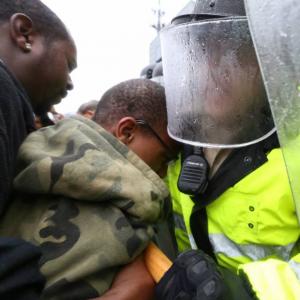



![By Federal Bureau of Investigation Workers (Federal Bureau of Investigation) [Public domain], via Wikimedia Commons](https://sojo.net/files/styles/large_square/public/blog/Mississippi_KKK_Conspiracy_Murders_June_21_1964_Victims_Chaney_Goodman_Schwerner.jpg)
